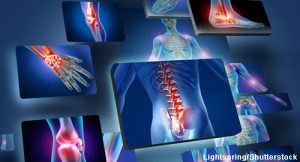 ACR CONVERGENCE 2020—In helping patients manage chronic conditions, such as rheumatic diseases, clinicians can tap into one of the most powerful resources at their disposal—the patient in front of them.
ACR CONVERGENCE 2020—In helping patients manage chronic conditions, such as rheumatic diseases, clinicians can tap into one of the most powerful resources at their disposal—the patient in front of them.
“We too often focus on what is wrong with a patient and try to address that, rather than considering how to harness a patient’s unique strengths to better help them cope with their illness and be a better partner in treatment,” said Afton L. Hassett, PsyD, associate professor in the Department of Anesthesiology, Division of Pain Research, Chronic Pain and Fatigue Research Center at the University of Michigan, Ann Arbor.
In her presentation on Nov. 9, 2020, Grit, Gratitude & Grace: Resilience Despite the Pain, Dr. Hassett discussed the evidence showing the connection between a patient’s resilience and improved health outcomes. She focused on three main components of resilience: grit, gratitude and grace, each of which comprises learned behaviors patients can develop and clinicians can foster.
Aspects of Resilience
Grit is a combination of perseverance and passion for long-term goals that provides meaning to one’s daily life.1 Data show grit, resilience and optimism are positively linked to time to pain threshold and pain tolerance.2 A tangible way in which grit helps patients deal with pain is illustrated by research showing people with grit exercise longer.3
One of the most intriguing approaches to building grit or perseverance, said Dr. Hassett, is changing a person’s mindset to embrace a growth mindset—the belief that abilities can be developed through dedication and hard work, which can lead to a desire to learn and improve.
Gratitude, according to Dr. Hassett, has a dual meaning when studied in psychology.4 People can feel grateful in a worldly sense—the feeling that occurs in interpersonal exchanges when one acknowledges receiving a valuable benefit from another—and in a transcendent sense, which is linked to spirituality and giving thanks in response to life.
One approach to building grit or perseverance, according to Dr. Hassett, is developing a growth mindset, which leads to a desire to learn through the belief that abilities can be developed through dedication & hard work.
The growing interest in the health benefits of gratitude is highlighted by the nearly 600 published articles on gratitude intervention for a wide range of health issues, including acute and chronic pain, rheumatoid arthritis, osteoporosis, back pain and many others, said Dr. Hassett.
Dr. Hassett discussed a number of ways to help patients develop gratitude, including keeping a daily gratitude diary in which a person writes down three things they are grateful for—three different things every day. Such an exercise provides perspective and mindfulness, and can lead to feelings of calmness, connectedness and humbleness.



